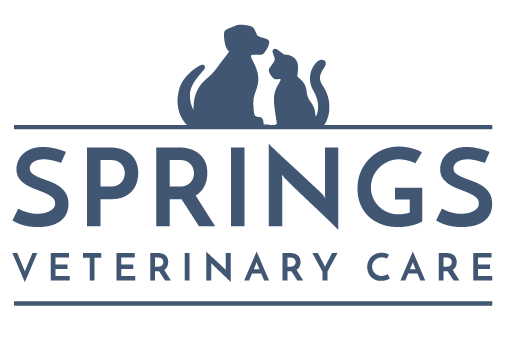Dental Health for Your Pet
If you’ve taken your pet to a veterinarian, there is a good chance they discussed your pet’s oral and dental health. And there is an equally good chance that they recommended a dental cleaning.
But why? You may ask. If they are eating, not whining or crying, then it can’t be that bad…right?
If a pet does not eat, they will starve. An animal’s desire to survive, if at all able, will overcome discomfort. Especially if that obstacle they must overcome is easy. In the case of dental disease, if one side of their mouth hurts more, then they will simply use the opposite side primarily…just like us.
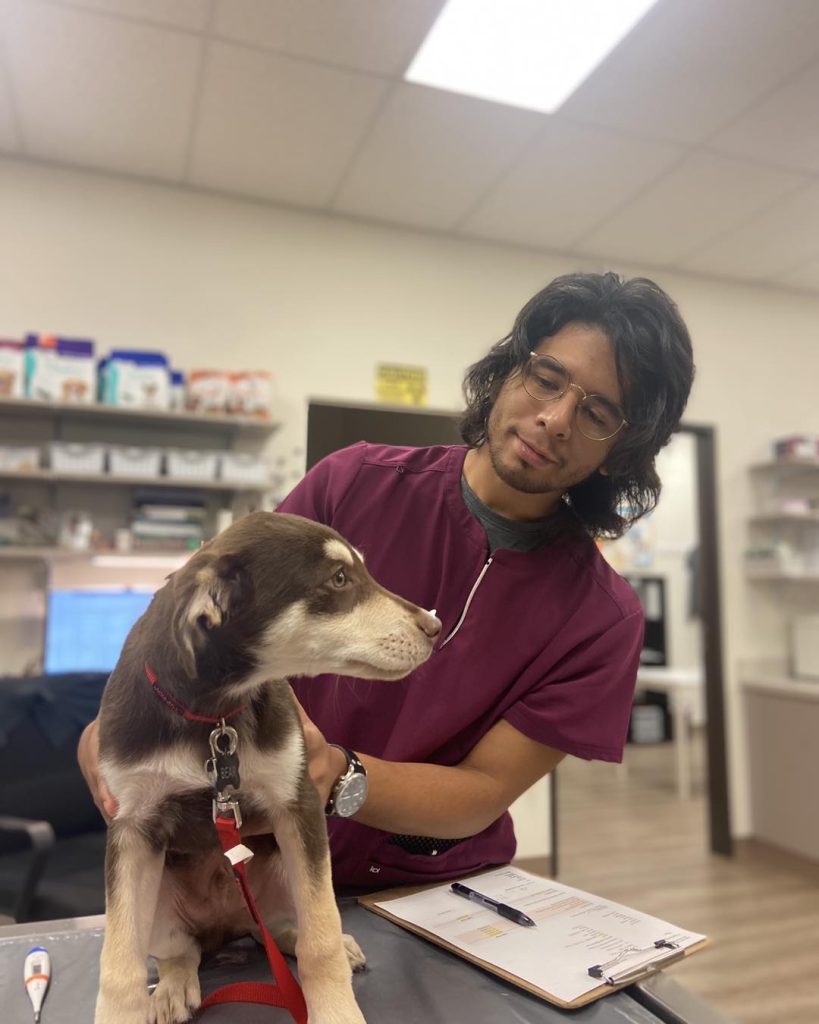 Dog Dental Cleaning: An Ounce of Prevention is Worth a Pound of Cure
Dog Dental Cleaning: An Ounce of Prevention is Worth a Pound of Cure
Unfortunately, dog and cat dental cleaning is much more involved than it is for us. Although the physical process of cleaning their teeth is similar to humans, it’s difficult to just get our pets to open their mouths and say “ah”. Therefore, our pet patients must be fully anesthetized for dental procedures, and that unfortunately adds to the complexity of the procedure.
Although some dental procedures can seem like quite an investment, they are much more affordable than removing teeth due to periodontal disease. Not only is this felt by you as the financier of the procedure, but it’s also felt by the patient in the form of recovery.
Maintenance cleaning, polishing, and a complete oral evaluation will allow us to address any issues immediately, many times before they ever become a problem. A general cleaning is a fraction of the cost of a cat or dog tooth extraction. Additionally, the recovery period after a straight-forward cleaning is minimal.
Brushing Your Pet’s Teeth Vs. A Full Cat or Dog Dental Cleaning
It’s great to brush your pet’s teeth, but it’s not a substitute for scaling and polishing your pet’s teeth.
I have a confession to make. I don’t brush my pets’ teeth. It’s just too difficult for me to remember. So, because of that I have a hard time recommending owners do that. That is filed firmly in the “Do as I say, not as I do” category.
Brushing your pet’s teeth is 100% good, and if you can do so routinely it is helpful.
But what about once every few days, or how about after your pet has significant tartar on their teeth? At that point it is not very helpful.
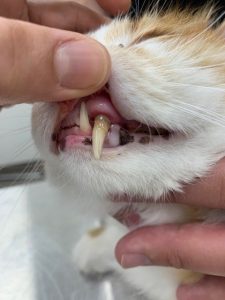
Cat and Dog Teeth Tartar Vs. Plaque
Understanding the difference between plaque and tartar is key here. Plaque is what builds up on the teeth daily. It is like uncured cement, and thus brushing can remove it. Tartar is what plaque turns into after it has cured. Brushing cannot remove tartar, you must get it off with a scaler. Plaque begins to “cure” or harden in around 24 hrs.
This means that brushing your pet’s teeth daily is helpful, but only if it is performed routinely. If your veterinarian recommended a dental cleaning, it is likely too late for brushing your pet’s teeth to have any noticeable positive impact.
Why is Dental Health an Issue Now for Pets?
The recommendation of routine dental cleaning is not something that was “mainstream” in the veterinary and pet health community 25+ years ago. Just like with any scientific endeavor, the research and data is evolving. Thirty years ago, I have no doubt that veterinarians were diagnosing dental disease. We could grossly see that the pet’s teeth were diseased, but frankly did not have the tools to properly diagnose the extent of the disease, nor the skills to address effectively.
Thankfully, veterinary medicine has evolved, and we now have the tools and skills to address it. With the advancement of these areas of veterinary medicine, came the advances in treating periodontal disease and removing teeth that we now have conclusive radiographic evidence are a problem.
There are a plethora of other issues that arise from unaddressed dental disease: from the obvious loss of teeth to very painful tooth root abscesses, which do prevent a pet from eating and require surgery. To secondary issues from literal mandibular or maxillary bone loss secondary to infection, oral-nasal fistulas (these are holes in the mouth that connect to the nasal sinus) and even are connected to endocardiosis (infection of the heart).
Do Breeds Require Different Dog Dental Care?
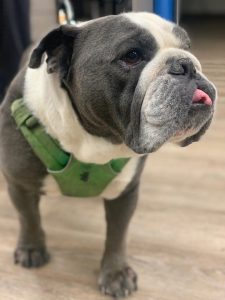
There are breeds of dogs that unfortunately are predisposed to having dental issues: Dachshunds, Poodles, Greyhounds, brachycephalic breeds to name a few. But a generality could be stated as such, if you have a small dog (under 20 lbs.), you should plan on budgeting for dental cleanings on a yearly basis at least.
Why is Dental Cleaning at the Groomer Less Expensive Than at the Veterinarian?
The services offered at the pet stores and some groomers are often marketed as “anesthesia free dental cleaning”. And they are correct, there is no anesthesia being utilized. Your pet is wide awake, while they are cleaning their teeth. Once again complete transparency, I’ve never seen this process performed in person, I have seen videos of demonstrations and have seen pets come in afterwards. I can tell you that the instruments that we use to appropriately check for periodontal pocketing, to remove the tartar and obtain x-rays would not in the least be safe to use in even the most well-behaved conscious animal.
Furthermore, the tartar that is seen on the teeth itself is not the dangerous stuff, it’s what is under the gumline that causes the big problems. We use the presence of the tartar on the teeth to give us a good indication of the risk of serious dental disease. If that tartar is gone, all it does is give a false sense of security.
One aspect about any professional service is that you aren’t paying for their expertise when everything goes right, you are paying for their expertise in the circumstance when things go wrong. That they will know what to do and be able to address that problem efficiently, effectively, and safely.
This truly is a matter of “you get what you pay for”. But admittedly we as a veterinary community can do a better job of educating our clients so you understand the value of what your pet is receiving.
Why Did My Veterinarian Recommended Full Mouth Extractions?!
There are several reasons why a pet’s mouth may be diseased to the point that your veterinarian would recommend full mouth extractions. It can be quite unsettling to hear such a dramatic treatment recommendation.
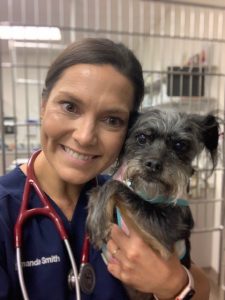
But rest assured, this is not a recommendation that is taken lightly by any veterinarian. Our goal is to prevent disease of any kind, and the preference would be to treat the disease rather than simply remove the problem.
The pain and discomfort is also something that must be addressed. We take all precautions necessary and do our best to proactively treat any discomfort, including continuing pain-relieving medications until the post-operative wounds are healed. It is important to remember that if a pet is in need of treatment this drastic, then the level of disease is quite severe and your pet is already in a pretty significant amount of pain.
There is often no escaping the cost, but there is an upside. Although it would be a larger than expected investment, the problem is completely rectified. So not only is your pet out of long term discomfort, because the teeth are removed, no further dental care would be necessary.
The overwhelming concern I receive though is related to how a pet will eat after their teeth are removed. This is fortunately not something we have to consider with our domesticated pets. A dog or cat’s teeth are primarily there for eating as their wild ancestors would. Pets don’t need to chew their kibble or canned food that they get from us. And so often, pets are happier and healthier than they were before.
Although dental health is perhaps not something that you remember being part of your childhood pets’ health care plan, it has always been a problem for pets. Our abilities to diagnose and treat dental disease have evolved, and we have also learned how to advise you on how to prevent dental disease. This means we feel much more comfortable advising you on how we can prevent and treat it. And remember just because your pet is still eating, it doesn’t mean they aren’t still hurting. Our goal is to keep your pet around with you for as long possible in as healthy of a state as possible.
